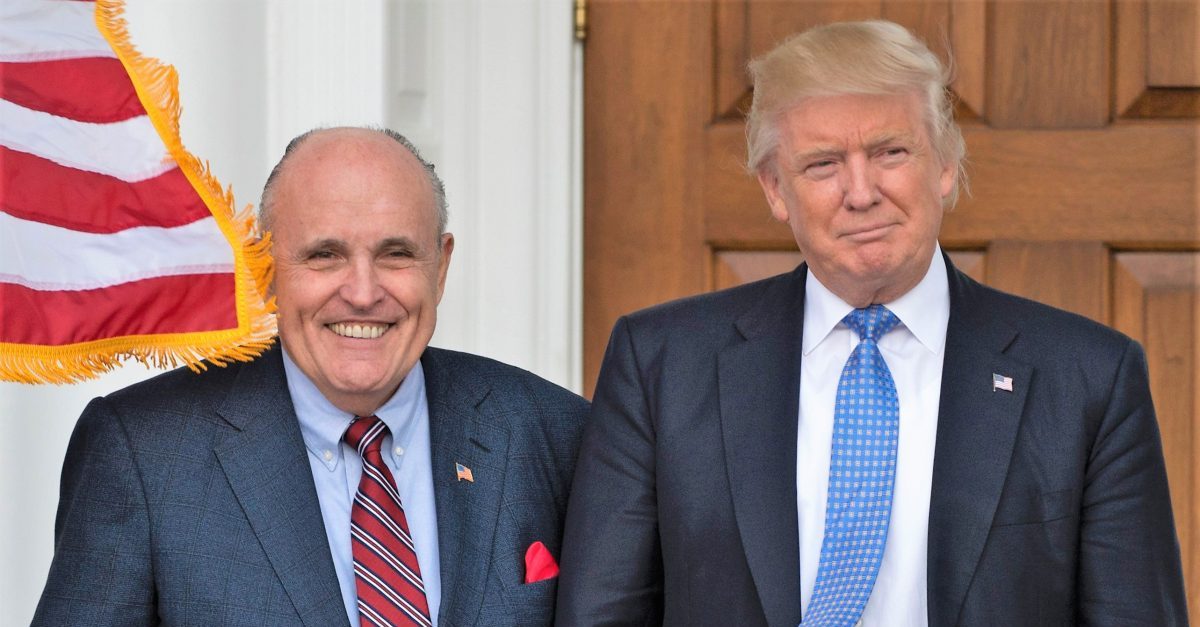
Rudy Giuliani, President Donald Trump’s attorney, is facing accusations that he, too, was somehow responsible for inciting the mob of documented Trump supporters who stormed the U.S. Capitol building. Now, he is using a rather convoluted bout of logic to explain away his comments as nothing more than lackluster references to the HBO series ‘Game of Thrones.’
Speaking at the rally that immediately preceded the capitol riots, Giuliani repeated a series of false conspiracy theories about widespread election fraud, telling the audience: “If we are wrong, we will be made fools of, but if we’re right, a lot of them will go to jail. So let’s have trial by combat.”
In an interview with The Hill on Wednesday, Giuliani said he was simply making a reference to the “very famous documentary” about “fictitious medieval England” called “Game of Thrones.” (The logical conundrum should be duly noted.)
“I was referencing the kind of trial that took place for Tyrion in that very famous documentary about fictitious medieval England,” Giuliani said. “When Tyrion, who is a very small man, is accused of murder. He didn’t commit murder, he can’t defend himself, and he hires a champion to defend him.”
It was not clear who Giuliani believed was analogous to Tyrion in the reference or why he believed what he admitted were fictions such as dragons and magic would be heavily included in a “documentary.”
The logical somersaults came as reports circulated that Trump is trying to stiff Giuliani’s chart-topping legal bills.
When joining the Trump campaign legal team’s nationwide efforts to torpedo the 2020 election results, Giuliani reportedly demanded extravagant fees and notched exactly zero victories in court. Outgoing President Trump is refusing to pay the former New York City mayor for his legal services, according to a Wednesday report from the Washington Post.
According to the report, two officials with knowledge of the situation told the Post’s Josh Dawsey that Trump has “instructed aides not to pay Giuliani’s legal fees” associated with the post-election lawsuits. The president has reportedly even taken to micro-managing his attorney’s expenditures, demanding that he “personally approve any reimbursements for the expenses Giuliani incurred while traveling on the president’s behalf to challenge election results in key states.”
The Post also corroborated previous reports that Giuliani had asked for $20,000 per day to lead the Trump campaign’s legal efforts to overturn the election. Legal ethics experts said the demanded remuneration raised red flags and questioned how Giuliani could charge such an astronomical sum—particularly since his experience as a former federal prosecutor who later ran a security consulting business does not even remotely make him an expert in election law. Per the Post’s reporting, Trump had “privately expressed concern” with several of Giuliani’s legal maneuvers and “did not appreciate” his attorney’s absurdly steep asking price.
At the time, Giuliani “strenuously denied” reports that he asked for the $20,000 figure, claiming anyone who said otherwise was “a complete liar.” The Post, however, revealed that one of Giuliani’s associates had actually put the amount in writing.
According to a report from the New York Times, Trump was “offended” by the monetary demand and told his aides “not to pay him at all.” One advisor told the Times that White House officials have also been instructed to block Giuliani’s calls to the president.
But the president’ refusal to pay his own personal attorney’s legal fees comes at a particularly inauspicious time for Trump, who on Wednesday was impeached for one count of inciting an insurrection at the U.S. Capitol and will require a legal team to represent him during his trial in the Senate.
[Image via DON EMMERT/AFP/Getty Images]